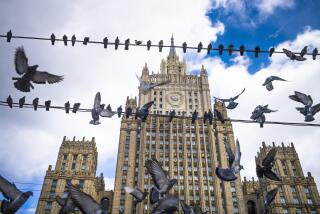Russia Backs Reforms and Democracy, Kozyrev Vows : Diplomacy: Yeltsin’s foreign minister assures Christopher that the war in Chechnya won’t deter Moscow from its course.
- Share via
GENEVA — Russian Foreign Minister Andrei V. Kozyrev pledged Tuesday night that the war in Chechnya will not divert Russia from its policies of fostering democracy and economic reforms, according to State Department officials.
During the first of two days of talks with Secretary of State Warren Christopher, the Russian official also said his boss, President Boris N. Yeltsin, will take steps to rebuild his political base among reformers in Russia, aides to Christopher reported.
Kozyrev was said to have made these promises at a private dinner with Christopher, which the two men held without staff aides or translators. The two are expected to have more formal meetings throughout the day today and then conclude with a formal press conference.
Kozyrev’s promises represented the most determined effort so far by the Russian government to persuade the Clinton Administration that the war in Chechnya does not represent a fundamental change of direction for Yeltsin and his government.
The assurances were what the Administration most wanted to hear.
Just before his first meeting with the Russian foreign minister, Christopher told reporters that the United States hopes to avoid letting the bloody war in Chechnya permanently damage ties between Washington and Moscow.
“This (Chechnya) . . . is a very serious episode, but we are certainly not going to turn our backs on the relationship” with Russia, Christopher said.
If Russia can end its Chechnya operations and work out a reconciliation with the Chechen rebels, he said, “I think it would be possible to pick up from here.”
He urged Russian leaders to “put this very adverse episode behind them.”
Christopher’s remarks underscored how desperately the Administration now wants Russia’s war in Chechnya to end.
U.S. officials fear that a prolonged conflict could accelerate the drift of Yeltsin’s government toward authoritarianism and also undercut any chance of winning support in Washington for American aid to Russia.
If the bloodshed in Chechnya continues, the secretary of state told reporters here Tuesday, “that will inevitably have consequences in our own public opinion and in our Congress.”
Christopher’s talks with Kozyrev are the first top-level meeting between the two governments since Russia’s army bogged down in Chechnya in what Yeltsin and his advisers had believed would be a short, successful military operation aimed at preventing Chechnya from seceding from the Russian Federation.
When first planned early last month, the talks between Christopher and Kozyrev were aimed at smoothing tensions over U.S. plans to support an expansion of NATO into Eastern Europe.
Now, with the war in the Caucasus dragging on, those frictions over the North Atlantic Treaty Organization are being overshadowed by American fears of much broader political changes in Moscow--changes that could jeopardize both Russia’s domestic reforms and its willingness to cooperate on foreign policy.
There was one new sign earlier this month of what the Administration considers to be the troubling direction of Russian foreign policy.
Russia announced that it had reached agreement on an $800-million contract to help finish Iran’s long-stalled experimental nuclear reactor at Bandar-e Bushehr on the Persian Gulf, a project that the United States had earlier persuaded other governments, such as Germany, to forsake.
“I’ll be expressing (to Kozyrev) our concern about any degree of (Russian) nuclear cooperation with Iran,” Christopher told reporters Tuesday. But he said he will merely mention the sales to Iran as one of many issues he will be raising with the Russian foreign minister, and he did not indicate that this subject will be given any special emphasis.
Christopher acknowledged that the Administration had given at least some thought to the idea of postponing the current round of talks with the Russian foreign minister until after the Chechnya crisis is over.
However, Christopher said, he decided to go ahead.
“I remembered that even in the darkest days of the Cold War, we had meetings with them,” the secretary of state said.
More to Read
Sign up for Essential California
The most important California stories and recommendations in your inbox every morning.
You may occasionally receive promotional content from the Los Angeles Times.













